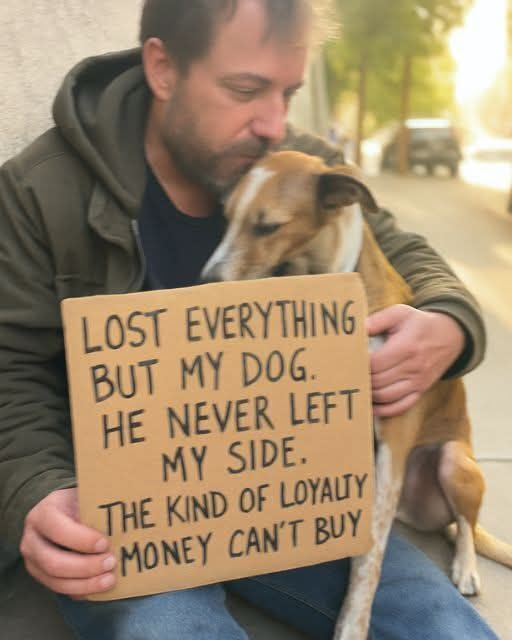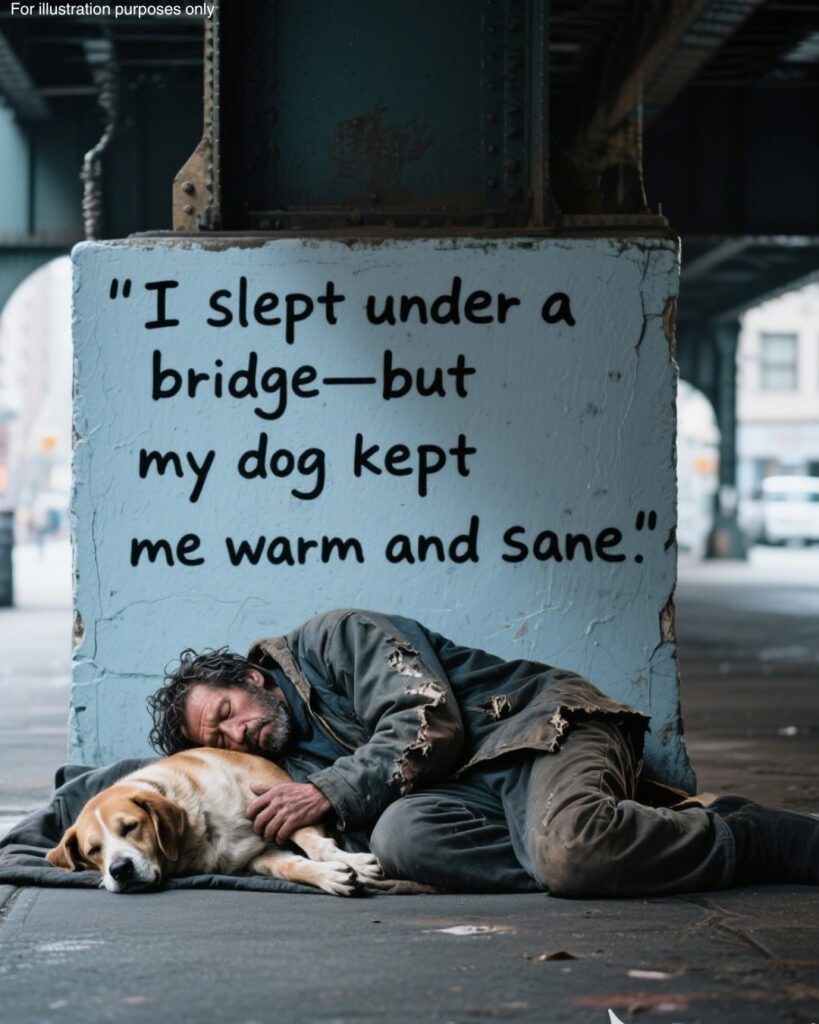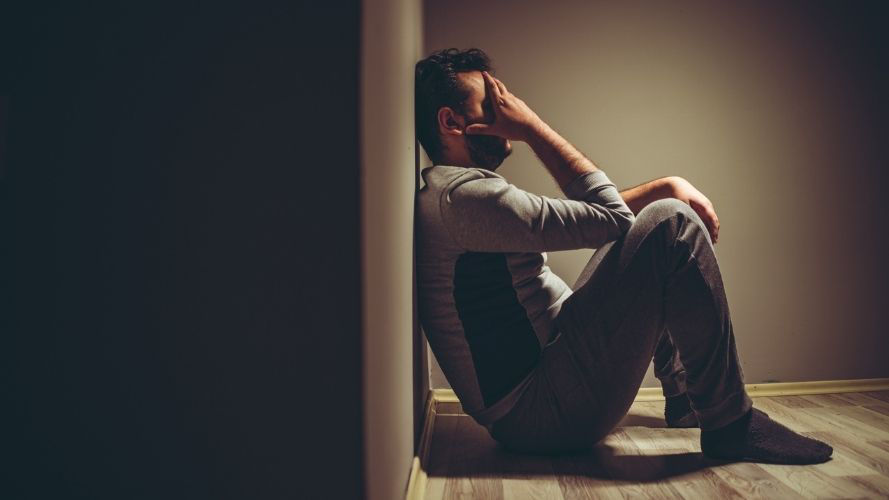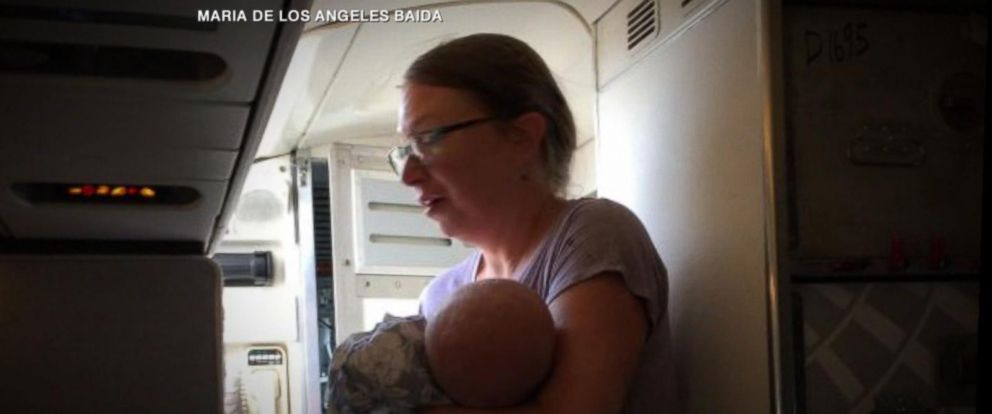Living Under a Bridge, I Found Hope in the Warmth of My Dog: I Didn’t Know Rock Bottom—Until I Went Two Weeks Without Hearing My Own Name
People talk about rock bottom like it’s something you can measure in money lost, jobs gone, or keys handed over to a landlord. But for me, it wasn’t when I lost my job. It wasn’t even the night I was evicted with nothing but a backpack and a dog leash.
Living Under a Bridge, I Found Hope in the Warmth of My Dog
Rock bottom came in silence.

Two weeks passed where no one said my name. Not one person looked me in the eye. It was like I’d vanished. Like I didn’t exist.
Except to Bixby.
Bixby, my scruffy little mutt with the big brown eyes and the softest ears, never once left my side. We slept in doorways, wrapped in what blankets we could find. We got rained on. We got ignored. And we got turned away from shelters—again and again—because most wouldn’t take pets. But Bixby stayed. He always stayed.
One morning, colder than usual, someone in a passing car tossed a sausage biscuit out the window. I caught it before it hit the ground. It felt like a feast. I tore it in half, handed Bixby his share. He sniffed it, then gently pushed his half back to me with his nose.
That broke me.
Not the hunger. Not the cold. Not the humiliation of holding a cardboard sign while people avoided my gaze. It was that single moment of love—unconditional, selfless love—that cracked something wide open inside me. I hadn’t begged. I never begged. I just held the sign so people might see me. But no one did.
Until one person did.
Last week, as I stood near the gas station holding my sign, a woman in blue scrubs slowed down. She rolled down her window and looked directly at me. Not through me—at me.

“We’ve been looking for you,” she said.
Five words. That’s all it took to make the silence shatter.
She showed me a photo—me and Bixby, taken weeks earlier by a social worker who’d tried to track us down. There was a place, she said. A safe one. A room. Dog-friendly. I didn’t believe her at first. Hope felt dangerous.
But five days later, we had a door that locked behind us. A clean bed. Heat. Bixby got his first warm bath in months. I got clean clothes and a chance to call my sister—who cried when she heard my voice.
Yesterday, Jen—the woman in scrubs—called again. She said, “We have a job opening. Would you be interested?”

I said yes.
Not just for me. For Bixby. For the loyalty and love that never wavered, even when the world did.
The Lesson:
People think it’s the cold that breaks you. Or the hunger. But it’s not. It’s the loneliness. It’s the way the world walks past you like you don’t exist.
But even the smallest act of kindness—a biscuit, a photo, a name spoken aloud—can light a spark in the dark.
If you ever find someone who stays by your side when the world turns away—don’t ever let go.
And if you’re ever in a position to be the person who sees someone who feels invisible… stop. Look. Speak. You could be the one to change everything.
I said yes to the job.
Not just for the paycheck. Not even just for the second chance. I said yes because for the first time in what felt like forever, someone believed I could still offer something. That I wasn’t broken beyond repair.
Jen met me at the community center that Monday. The job wasn’t glamorous—it was janitorial work, cleaning the same halls that had once handed me paper bags of donated food. But the key difference? I had a badge with my name on it. I hadn’t seen my name printed anywhere in years. Seeing it, wearing it, hearing it spoken again—it made me feel human.
I’d start early each morning, before the center opened. Scrubbing floors. Emptying trash. Wiping down tables. It was hard work, but honest. And after my shift, I’d walk to the park where Bixby and I used to sleep on a bench. Not because I missed those days, but to remind myself how far we’d come.
Bixby adjusted faster than I did. He had his own dog bed now, some chew toys, and even a little coat someone from the shelter had donated. He strutted around the building like he owned the place. Everyone at the shelter knew his name. People smiled when they saw him. They smiled at me too now.
One of the caseworkers, Marla, helped me put together a resume. She talked about programs that could help me get certified for additional work—maybe even security, or assistant maintenance. I never thought I’d care about something like that again, but suddenly, I wanted more. Not out of greed—but out of gratitude.
I even got my first paycheck last Friday. It wasn’t much, but I cashed it and bought Bixby a big bone and myself a hot meal that didn’t come in a paper bag. I sat there, eating real food in a warm café, and tears slipped down my cheeks before I could stop them. Not from sadness—but from the sheer relief of having made it through.
That night, I sat in our little room—Bixby snoring beside me—and wrote a letter to my sister. Not a phone call this time. A letter. I told her everything. About Leah. About the streets. About Bixby. About how I’m trying. Really trying.

I’m still scared. I still have moments where I wake up thinking I’m back on the pavement, cold and invisible. But every time Bixby curls up beside me or someone calls me by name, that fear fades a little more.
The Real Lesson:
Rock bottom isn’t one moment. It’s a slow unraveling of identity, of self-worth, of being seen. But rising? Rising starts in small, quiet victories.
A warm meal. A clean bed. A name tag. A dog who never gave up.
If you know someone who’s struggling—don’t underestimate the power of showing up. Of saying their name. Of treating them like they matter, even when they don’t believe it themselves.
Because no one climbs out of rock bottom alone. And sometimes, all it takes is one person—and one loyal dog—to remind you that you’re still here. Still human. Still worthy of coming home.




